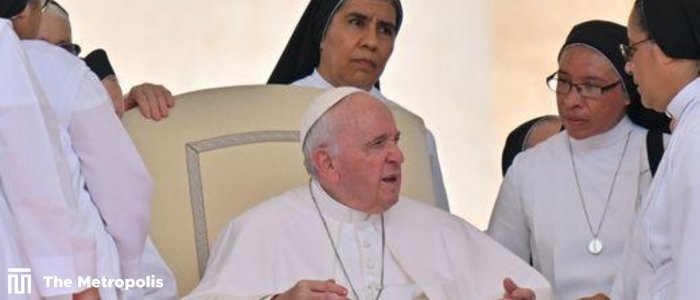Photo: Collected –
Metropolis Desk-
Dozens of women will be allowed to vote at an upcoming meeting of bishops, Pope Francis has decided, in a landmark move aimed at broadening female and laypeople voices in the male-exclusive life of the Catholic Church.
Francis approved changes to the norms governing the Synod of Bishops, a Vatican body that gathers the world’s bishops together for periodic meetings, following years of demands by women to have the right to vote, reports Al Jazeera.
The Vatican on Wednesday published the modifications the pope approved, which emphasise his vision for the lay faithful taking on a greater role in church affairs that have long been left to clerics, bishops and cardinals.
Catholic women’s groups that have long criticised the Vatican for treating women as second-class citizens praised the move as historic in 2,000 years of the church.
“This is a significant crack in the stained glass ceiling, and the result of sustained advocacy, activism and the witness” of a campaign of Catholic women’s groups demanding the right to vote, said Kate McElwee of the Women’s Ordination Conference, which advocates for female priests.
Over the years, Francis has upheld the Catholic Church’s ban on ordaining women as priests, but has done more than any pope in recent times to give women a greater say in decision-making roles in the church.
He has appointed several women to high-ranking Vatican positions, though none leads any major Vatican office or department.
Since the Second Vatican Council, the 1960s’ meetings that modernised the church, popes have summoned the world’s bishops to Rome for a few weeks at a time to debate particular topics. At the end of the meetings, the bishops vote on specific proposals and put them to the pope, who then produces a document taking their views into account.
Until now, only men could vote.
But under the new changes, five religious sisters will join five priests as voting representatives for religious orders. In addition, Francis has decided to appoint 70 non-bishop members of the synod and has asked that half of them be women. They too will have a vote.
The aim is also to include young people among these 70 non-bishop members, who will be proposed by regional blocs, with Francis making a final decision.
“It’s an important change, it’s not a revolution,” said Cardinal Jean-Claude Hollerich, a top organiser of the synod.
The next meeting, scheduled for October, is focused on the very topic of making the church more reflective of, and responsive to, the laity – a process known as “synodality” that Francis has championed for years.
So far only one woman is known to be a voting member of that October meeting, Sister Nathalie Becquart, a French nun who is undersecretary in the Vatican’s Synod of Bishops office. When she was appointed to the position in 2021, she called Francis “brave” for having pushed the envelope on women’s participation.
Catholic Women’s Ordination, a UK-based group that says it is devoted to fighting misogyny in the church, welcomed the reform but asked for more.
“CWO would want transparency, and lay people elected from dioceses rather than chosen by the hierarchy, but it is a start!” said the CWO’s Pat Brown.
SOURCE: AL JAZEERA AND NEWS AGENCIES



